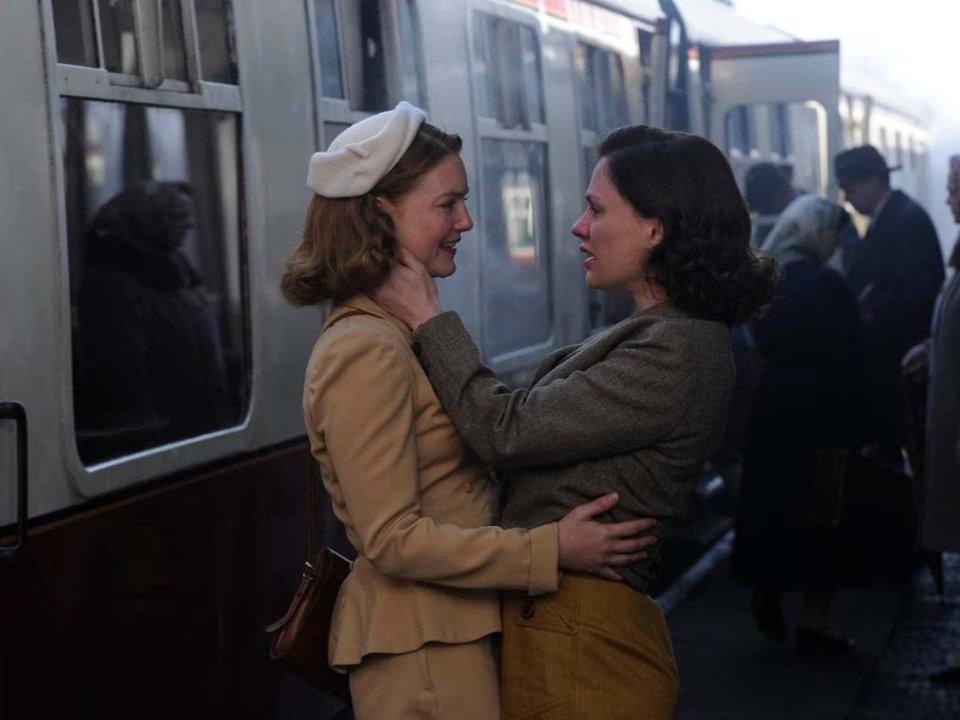Tell it to the Bees Review: Impressive performances save an otherwise predictable tale of forbidden romance
Dir: Annabel Jankel. Starring: Anna Paquin, Holliday Grainger, Gregor Selkirk, Euan Mason, Lauren Lyle, and Kate Dickie. 15, 108 mins
If your period drama is feeling a little on the stale side, why not unleash a giant swarm of bees? That’s the direction taken by Annabel Jankel’s new film, which sees the final act of its fairly predictable tale of forbidden romance interrupted by a sudden insect-led intervention. The scene in question feels so at odds with the sturdy, unceremonious realism of the rest of the film, it seems almost laughable.
Tell it to the Bees, adapted from Fiona Shaw’s novel by sisters Henrietta and Jessica Ashworth – who also worked on the second season of Killing Eve – takes place in an unnamed Scottish village in 1952. Lydia (Holliday Grainger), brought here from Manchester by her husband Robert (Emun Elliott), has been a social pariah from day one, both because of her outsider status and the fact her marriage came after her pregnancy. The local gossipmongers have branded her a “wild one”.
Things take a turn for the worse when Robert, traumatised by the war and now a mere shadow of the man she once knew, abandons Lydia and their son Charlie (Gregor Selkirk), leaving them without the support they need to get by. Their only comfort is Dr Jean Markham (Anna Paquin), the new doctor in town, who’s befriended the lonely and inquisitive Charlie, introducing him to the hive of bees that she keeps on the grounds of her late father’s home. She tells him to share his secrets with the creatures, in accordance with an old European custom that dictates the hive should be kept up to date with the lives of their keepers, lest they otherwise fly away.
The trio seem clearly suited for each other, because Jean isn’t exactly a welcome presence in the village, either. Not only do her neighbours bristle at the idea of a female medical practitioner, but she’s dogged by talk of the “incident” that forced her to flee her hometown in the first place. And, while Charlie is striking up an odd camaraderie with the residents of the beehive, Lydia and Jean are growing increasingly close, as their friendship slowly develops into something more.
There’s nothing particularly epic or romantic about their affair, despite the immense prejudice they face. It’s almost as if their love was born more out of comfort and convenience, as they’re the only two people in the village that seem to have any understanding of each other. Although Paquin’s Scottish accent hasn’t particularly improved since her screen debut at age 10 in The Piano, she and Grainger both offer impressive performances grounded in sense of quiet surrender, suggesting they’ve spent years simply saying nothing and keeping their heads down.
And perhaps that was exactly the point Tell it to the Bees wanted to get across – that revolutionary acts don’t always loudly pronounce themselves as such – but it’s a subtle idea that’s otherwise drowned out by the film’s constant focus on dramatic displays of suffering, specifically the suffering of women. There’s a mother forced to keep watch over a dead child, tucked into the only bed in her one-room home. There are several sexual assaults and other violent acts, while Lydia lives under the constant threat of her son being taken away from her.
Jankel is otherwise known as the co-creator of Max Headroom, a 1980s parody of the flashy, insincere TV show host, and as the director of 1993’s bizarre Super Mario Bros adaptation. She also has a string of music videos and commercials to her name. It’s a career that’s so far suggested she swerves towards outsized narratives and exaggerated imagery, which might explain the path taken here.
Yet, this is a film that otherwise possesses the mood of a gentle, afternoon drama on the BBC, meaning all this misery feels directionless, as if it only exists in an attempt to dismiss it as an artefact of the past (i.e. look how much better things are now!) It’s no coincidence that so many LGBT+ stories are set in the past, since it’s easier to feel grateful about what’s changed, rather than face up to the many battles that still need to be fought. Tell it to the Bees, then, is a period drama with no sting. There’s no urgency to its message, no passion at its centre. All there is, really, is a big swarm of bees.
Tell it to the Bees is released in UK cinemas on 19 July

 Yahoo Movies
Yahoo Movies 

